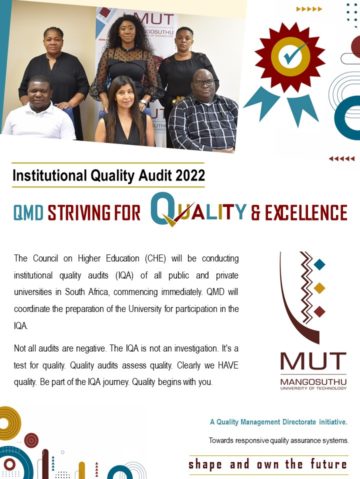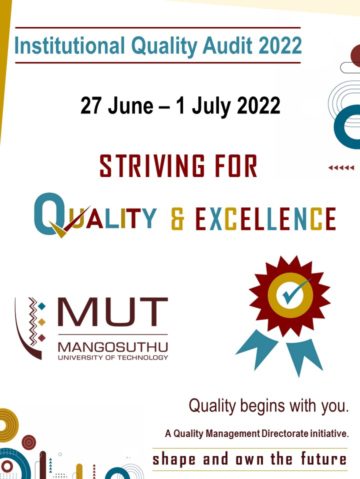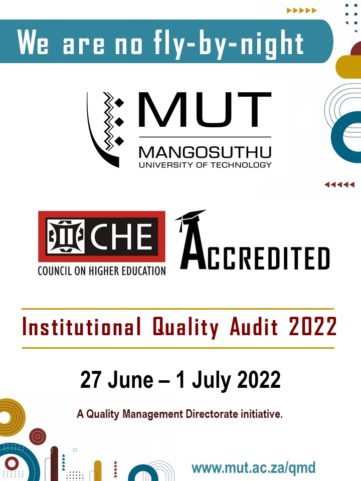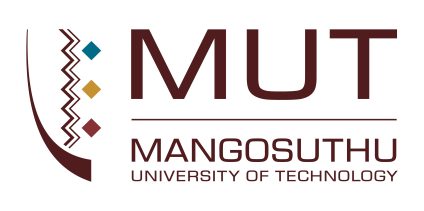
About this Department
A university thrives or fails due to the quality of its teaching – which determines the credibility of its qualifications. MUT therefore conducts an annual audit of its internal standards, to ensure the highest quality of teaching and learning, research and community engagement. This responsibility falls under the Quality Management Directorate and involves the entire university – students, staff and stakeholders.
The national Council of Higher Education (CHE) has a permanent sub-committee that oversees both internal quality assurance of all universities and conducts an independent Institutional Audit. MUT stakeholders have been trained to participate in the annual Self-Evaluation Report, which results in a site visit conducted by the CHE audit panel. This audit is intended to evaluate the quality of services at MUT.
The Quality Management Directorate, therefore, is tasked with ensuring that the quality, appropriateness and integrity of its services consistently exceed the minimum requirements set by regulatory and professional bodies.
In line with its mandate the Directorate oversees, supports and evaluates all internal and external accreditation processes for new and existing programmes. It conducts programme and thematic reviews, co-ordinates Module Surveys and the annual Graduate Survey, and ensures the integrity of the assessment process.
Further, the Directorate coordinates institution-wide quality-related projects (including regulatory body projects), provides quality-related support for professional-body accreditation and performs other quality-related functions as mandated by the University’s Executive Management Committee.
Due to this tireless cycle of assessment, evaluation and improvement, MUT is able to maintain high standards of qualifications and accreditation.
The Council on Higher Education (CHE) is responsible for the quality assurance of higher education (Higher Education Act 101 of 1997, 1997; Higher Education Amendment Act No. 39 of 2008). The CHE assigns the primary responsibility for assuring a high quality of provision, in the core areas of Teaching and Learning, Research, and Community Engagement to higher education institutions, and is the responsibility of all students, staff, and stakeholders of the University (White Paper 3, 1997). At the Mangosuthu University of Technology (MUT), the responsibility for institutional level quality assurance processes is assigned to the Quality Management Directorate (QMD). Through its quality assurance and enhancement processes, MUT ensures that the quality, appropriateness, and integrity of its teaching and learning, assessment, research, and community engagement consistently meet and aspire to exceed the minimum requirements of the University, the regulatory and professional bodies.
In line with its mandate and as part of its scheduled activities, the QMD has oversight of and supports the internal and external programme accreditation processes for new and existing programmes, conducts programme and thematic reviews, coordinates Module Surveys and the annual Graduate Survey and ensures the integrity of the assessment process through regular reviews and audits. Further, the QMD coordinates institution-wide quality-related projects (including regulatory body projects), provides quality-related support for professional body accreditation and performs other quality-related functions as mandated by the University’s Executive Management Committee (EMC).
The QMD has in place the requisite policies, procedures, strategies and resources that underpin the approach to quality assurance at MUT and takes into cognisance the institutional and national legislative requirements that are indicators of minimum standards necessary to support and enhance the quality of provision. Given that the University’s 2020-2025 strategic plan lists excellence in teaching and learning, research and community engagement as its Strategic Goals 1, 2 and 3, the QMD ensures that the outcomes of quality assurance processes are used to improve the quality of provision across the University. All quality assurance processes lead to the development and implementation of improvement plans, the progress of which is monitored and reported on regularly. In this way, MUT is able to ensure that it engages in a continuous cycle of planning, implementing, monitoring and evaluating and that it is on the trajectory to improvement and achieving its strategic goals.
Mangosuthu University of Technology is currently preparing for the Institutional Audit that is being conducted by the Council on Higher Education (CHE). This is one of the key mechanism that the Council on Higher Education uses, through its permanent sub-committee, the Higher Education Quality Committee, to assess higher education institutions’ internal quality assurance mechanisms and identify areas for improvement. University stakeholders have been trained to effectively participate in the development of the Self-Evaluation Report, which will be sent to the CHE on the 1st of April 2022. A CHE audit panel will conduct a site visit to evaluate the University in the period from 27th June – 1st July 2022. The outcome of this audit will be used to further strengthen the University business and the quality of provision. Its all hands on deck, until then.
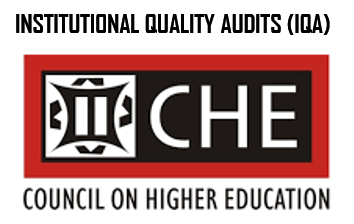
Mangosuthu University of Technology is currently preparing for the Institutional Audit that is being conducted by the Council on Higher Education (CHE). This is one of the key mechanism that the Council on Higher Education uses, through its permanent sub-committee, the Higher Education Quality Committee, to assess higher education institutions’ internal quality assurance mechanisms and identify areas for improvement.
University stakeholders have been trained to effectively participate in the development of the Self-Evaluation Report, which will be sent to the CHE on the 1st of April 2022. A CHE audit panel will conduct a site visit to evaluate the University in the period from 27th June – 1st July 2022. The outcome of this audit will be used to further strengthen the University business and the quality of provision. Its all hands on deck, until then.
IQA 2022

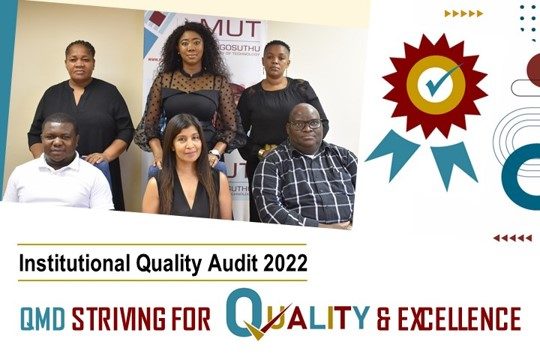
The Council on Higher Education, in keeping with its legislated mandate, has embarked on institutional audits across all public and private universities in South Africa 2021. The audit of MUT was initiated on the 01st July 2021 and will culminate in a site visit from the 14-18 November 2022. Central to the IQA is the HEQC’s approach in finding the balance between accountability and improvement by evaluating the University’s internal quality assurance systems. In this regard the HEQC requires institutions to critically reflect on and account for the quality of provision with a view to improving student success. The IQA involves participation of the entire University community, the outcomes of which will be used for the enhancement of university processes and will provide a baseline for the new Quality Assurance Framework (QAF). The University will benefit from the process as the approach taken for the IQA requires the University community to develop a holistic understanding of quality assurance which will in turn lead to the improvement of the University’s quality of provision. This will have a positive impact on the University’s reputation as a credible higher education institution.
2021 Institutional Quality Audit
The Council on Higher Education (CHE) will be conducting institutional quality audits (IQA) of all public and private universities in South Africa, commencing immediately. QMD will coordinate the preparation of the University for participation in the IQA. This memo therefore requests your participation in this audit.
Participation in the IQA provides the opportunity for MUT to reflect on its practices and identify good practice as well as areas of development, which will ultimately lead to enhancement across the university. This can only bode well for the University’s goal to achieve excellence in teaching and learning, research and community engagement and will have a positive impact on its reputation as a credible higher education institution.
The IQA will involve participation of the entire University community, the outcomes of which will be used for enhancement of University processes and will feed into the new Quality Assurance Framework (QAF). The University as a whole will benefit from the process as the approach taken for the IQA requires and will enable the University community to develop a holistic understanding of quality assurance which will in turn lead to the improvement of the university’s quality of provision.
We will continue to keep you updated as we receive information and will endeavour to prepare the University for constructive and meaningful participation in the IQA. We look forward to working with you all.
DOCUMENTS
MEMO
Click hereManual for Institutional Audits
Click HereFramework for Institutional Audits
Click hereInstitutional Quality Audit 2011
The Audit of Mangosuthu University Technology was conducted by the HEQC in terms of its mandate in 2011.The Audit Report outlines the process and findings of the Audit based on the Self-Evaluation Report, site visit, supporting evidence and other activities conducted during the audit between 8 and 13 May 2011.
For MUT Staff only, access via the Staff Intranet
• Institutional Audit 2011 Self-Evaluation Report
• Institutional Audit 2011 Report from the CHE
• Institutional Audit 2011 Improvement Plan
CHE MUT IQA Workshop 14 February 2022
MANDATE
• Promote the culture of quality across the university
• Promote compliance with Quality Assurance Systems;
• Develop and Monitor the implementation of quality assurance policies, procedures and other quality-related related documents;
• Monitor the implementation of strategic priorities through appropriate review processes;
• Participate in institutional planning;
• Prepare for Institutional Audits;
• Facilitate Institutional links with the HEQC;
• Provide strategic quality-related guidance to academic and support departments;
• Conduct programme reviews;
• Provide quality-related support for programme development;
• Provide quality-related support for the development of short courses;
• Provide quality-related support for the approval and (re)accreditation process of academic programmes and short courses;
• Conduct departmental evaluations (Support and Academic Departments);
• Provide quality-related support to academic and support departments in drafting implementing improvement plans;
• Conduct student and graduate surveys;
• Assist the institution in the preparation for institutional audits
• Facilitate capacity development in the field of quality assurance
Mission
The Quality Management Directorate’s mission is to:
- Provide strategic leadership to the university on quality-related matters
- Lead and manage quality assurance
- Monitor and evaluate the effectiveness of quality assurance and improvement
- Make recommendations on the improvement of quality assurance processes
Vision
The vision of the Quality Management Directorate, is to be the impetus leading the university to achieving its vision of being a transformed, equitable, sustainable university of technology, providing a high quality education
MEET OUR TEAM






Contact Us
Dr M Moodley
PhD (UKZN), MEd (UKZN),
BEd Hons (UND),
B. Paed (UDW)
DIRECTOR QMD
Tel: 031 907 7503
Moodley.suri@mut.ac.za
ACCREDITATION
Programme accreditation is a quality assurance process that ensures that the programmes that are offered at MUT, undergo a rigorous process of evaluation to ensure that they meet the minimum quality requirements of the regulatory bodies, where applicable, the statutory professional bodies, and comply with university policies and procedures. At MUT, the process of programme accreditation is underpinned by the Quality Assurance Policy, Programme Development Policy and related University policies. The accreditation of new programmes at MUT is informed by the University’s own internal quality assurance process for programme development. MUT’s internal quality assurance processes incorporate the prescripts of the DHET, CHE and SAQA, a form of quality assurance which leads to the improvement in the quality of programmes.
In common with higher education systems in many parts of the world, South African higher education faces multiple stakeholder demands for greater responsiveness to societal needs. This is accomplished through enhancing student access and success, research and innovation that address social and community engagement and economic development at local, regional, and international level. Stakeholders also require that higher education institutions be able to provide the public with comprehensive information on the way they maintain the quality and standards of their core academic activities, and to demonstrate sustained improvement in this regard.
The HEQC’s approach to programme accreditation is informed by the complex challenges facing higher education institutions in an era of radical restructuring within South African higher education. In line with the vision of the White Paper 3: A Programme for the Transformation of Higher Education, 1997, the programme accreditation system seeks to be responsive to the objectives of higher education transformation as reflected in various policy and legislative documents that have been published since 1994.
The Quality Management Directorate (QMD) supports internal approval for new and amendments to existing programmes. In addition, QMD facilitates accreditation with regulatory bodies like the Department of Higher Education and Training (DHET), Council on Higher Education (CHE) and South African Qualification Association (SAQA). The supportive and facilitative role of the Directorate extends to external accreditation and endorsement of programmes by statutory professional bodies. QMD ensures that MUT programmes consistently meet the quality criteria of the University and the external accrediting bodies.
To access the policies, procedures and supporting documents that govern programme accreditation at MUT, click on the link below.
Internal Accreditation ( For MUT Staff only, access via the Staff Intranet)
Regulatory Bodies
Reviews
Quality reviews are a quality assurance mechanism adopted by MUT as a means of assuring quality and ensuring continuous improvement in the quality of provision. The QMD conducts quality reviews across the academic and support sectors in the University. The review provides the opportunity for divisions across the University to engage in reflexive praxis and in so doing measure their own performance against set criteria with the aim of enhancing the quality of provision. A panel of peer experts, internal and external to the university, evaluates the unit under review against set criteria to identify strengths and areas of development and, based on that, make recommendations for improvement. The review culminates in a report with recommendations for improvement which divisions use in the development of their improvement plans to enhance the quality of provision. In this way the quality review provides information that will enable the University to make informed decisions about its programmes in terms of fitness for and of purpose, value for money and transformation. Further, the review measures the effectiveness and efficiency of the unit’s quality assurance systems (policies, systems, resources, and strategies) in achieving its goals and in contributing to the achievement of the University’s vision and strategic goals.
Programme reviews are conducted every 5 years in accordance with the University policies. Other quality reviews such as thematic reviews and reviews of the support and administrative units (including centres and institutes) are conducted as mandated by the University’s Executive Management Committee (EMC).
The audit of assessment mark changes is conducted to ensure the integrity of assessments by encouraging accountability and reducing the risk associated with the capturing and changing of assessment marks.
Monitoring and Evaluation of the Procedures for the Security of Examination Papers in the Examination Section
QMD monitors and evaluates the implementation of the Procedures for the Security of Examinations Papers in the Examinations office during every examination session to ensure the credibility and integrity of the examination process.
Surveys are a quality assurance mechanism used to elicit views from MUT stakeholders with the aim of using the feedback to improve the quality of provision. Surveys can be used to assure all stakeholders and the public of the University’s commitment to enhance quality, identify and inform good practice and to promote and further develop the culture of quality at MUT. Participation in surveys is voluntary and participants are assured of confidentiality. The outcomes of Surveys are triangulated with outcomes of other quality assurance processes and used constructively to enhance the student experience at MUT and by extension, student success. QMD coordinates the preparation and analysis of Module and Graduate Surveys across the University.
Principles and Procedures (For MUT Staff only)
The Module Survey is conducted by the QMD to elicit students’ views of their experiences of teaching and learning in their registered modules. The surveys are underpinned by principles and procedures to ensure that they are conducted in a fair, transparent, and consistent manner, that no harm is caused to those who participate and that the outcomes of the processes are used to enhance teaching and learning and by extension, student success.
The Quality Management Directorate (QMD) conducts a graduate survey annually to elicit graduates’ views of their overall learning experiences at MUT. The graduate survey is conducted as part of MUT’s commitment to assuring and enhancing the quality of provision. The outcomes of the survey are used to inform improvement across the University. To access previous survey reports, improvement plans and questionnaires click on the links below.
Graduate Survey 2020 Faculties
Documents
Charters (For MUT Staff only)
Policies (For MUT Staff only)
Principles and Procedures (For MUT Staff only)
Protocols (For MUT Staff only)
Institutional Documents
Documents For 2011 Audit
Quality Enhancement Project- QEP
QEP 1 Criteria
MUT Self-evaluation report
QEP 2 Criteria
MUT Self-evaluation report
Events, Workshops and Announcements
QMD conducts workshops on various activities that fall within the mandate of the directorate. Below are a list of some of the workshops and meetings that were conducted/ coordinated by the QMD since 2020:
• Preparation workshop: Developing the Self-Evaluation report for Programme Reviews (Karridene Hotel, 19th February 2020)
• CHE Institutional Support Workshop (24 February 2021)
• Workshop: Designing and developing an electronic database for programme reviews (Microsoft Teams, 01st March 2021)
• Preparation workshop: Developing the Self-Evaluation report for Programme Reviews (Karridene Hotel, 03rd March 2021)
• Workshop: Internal Stakeholder Engagement – Institutional Audit 2021/ 2022 (19th August 2021)
• Workshop: Institutional Audit Workshop (CHE, 23rd August 2021)
• Presentations in the third quarter Faculty Board: Institutional Audit 2021/ 2022 (QMD, August 2021)
• Ongoing Consultations: Institutional Audit 2021/2022 (QMD)
• Conceptualisation and design of the electronic repository: Institutional Audit 2021/ 2022 (QMD/ ITN, September 2021)
Campaigns
